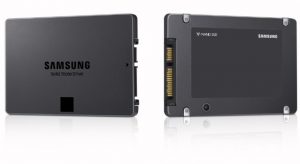Solid-state drives (SSDs), like all other data storage devices, can fail.
In fact, SSDs have a set lifespan — eventually, the floating gates SSDs use to store data become less reliable, as we discussed in our article about SSD wear leveling.

A Samsung solid-state drive.
But while memory wear is a concern at scale, most SSDs can last for years while providing dependable functionality (and unless you’re writing tremendous amounts of data to your device on a regular basis, we wouldn’t worry too much about write cycles).
At Datarecovery.com, we’ve recovered data from thousands of SSDs from every manufacturer — and memory wear is rarely the culprit. Below, we’ll address several of the primary causes of SSD failure and data loss.
Most Common Causes of SSD Failure
If you’ve lost important files due to an SSD failure, we’re here to help. We provide risk-free evaluations and our no data, no charge guarantee: If we cannot successfully retrieve your data, you don’t pay for the attempt. Call us today at 1-800-237-4200 or submit a case online to get started.
1. Firmware Corruption
The firmware provides the SSD with instructions for accessing data; it also has various algorithms for wear leveling and other processes. If the firmware fails, the drive stops functioning.
Firmware failures are relatively rare, but they can occur if a firmware update is interrupted. Occasionally, manufacturers may also find defects in firmware that can cause a failure during certain operations or after a certain period of operating hours (for example, HP issued a critical revision addressing SAS SSDs back in 2019, and Samsung issued a similar revision for its 2TB 980 Pro earlier this year).
To avoid data loss, back up your data before upgrading your firmware and make sure that your machine stays powered on throughout the process. This should go without saying, but don’t mess with the firmware unless you have a good reason to do so — only use firmware update utilities provided by your device’s manufacturer.
2. Electronics Issues
SSD memory is robust and dependable, but the electronics that allow the drive to interface with your computer are susceptible to the same faults as any other controller.
Power surges and other electrical irregularities can damage any controller. If your computer is hooked up to a working surge protector, this is less of a concern — but a faulty power supply can also damage a controller. Occasionally, manufacturing defects can cause controller components to fail prematurely.
When electronics damage occurs, the SSD may fail entirely or present unusual symptoms (for example, it may inaccurately report the amount of available free space).
To fix this issue, data recovery engineers will need to replace the damaged electronic components, which is a sensitive process — a failed attempt can leave data completely unrecoverable, so we strongly recommend working with a trusted data recovery partner.
3. File Corruption, Malware and User Error
SSDs don’t have moving components, and while physical damage can occur, logical (non-physical) issues are far more common.
For example:
- If the computer loses power or an application shuts down during a write process, files may become corrupt and unreadable.
- Accidental file deletion is a particular cause for concern due to the methods that SSDs use to store data. If the SSD’s TRIM command executes after file deletion, data is unrecoverable — if you accidentally delete files from an SSD, we recommend disconnecting your SSD from its power source as soon as possible.
- All storage media is susceptible to malware and ransomware.
In this article, we’re not discussing environmental failure scenarios, but those can also occur. Compared with hard drives, SSDs are less likely to lose data due to a physical blow — but a significant hit can certainly damage components (in other words, don’t treat your SSD like a football).
Is data recovery possible on solid-state media?
The good news: Data recovery is possible in the vast majority of SSD failures. However, you generally have one chance to get the data back — work with a professional data recovery provider for optimal results.
Datarecovery.com operates full-service laboratories at every location. Each laboratory is outfitted for SSD data recovery, and we support all of our services with our no data, no charge guarantee. To learn more, call 1-800-237-4200 to speak with a member of our team.




